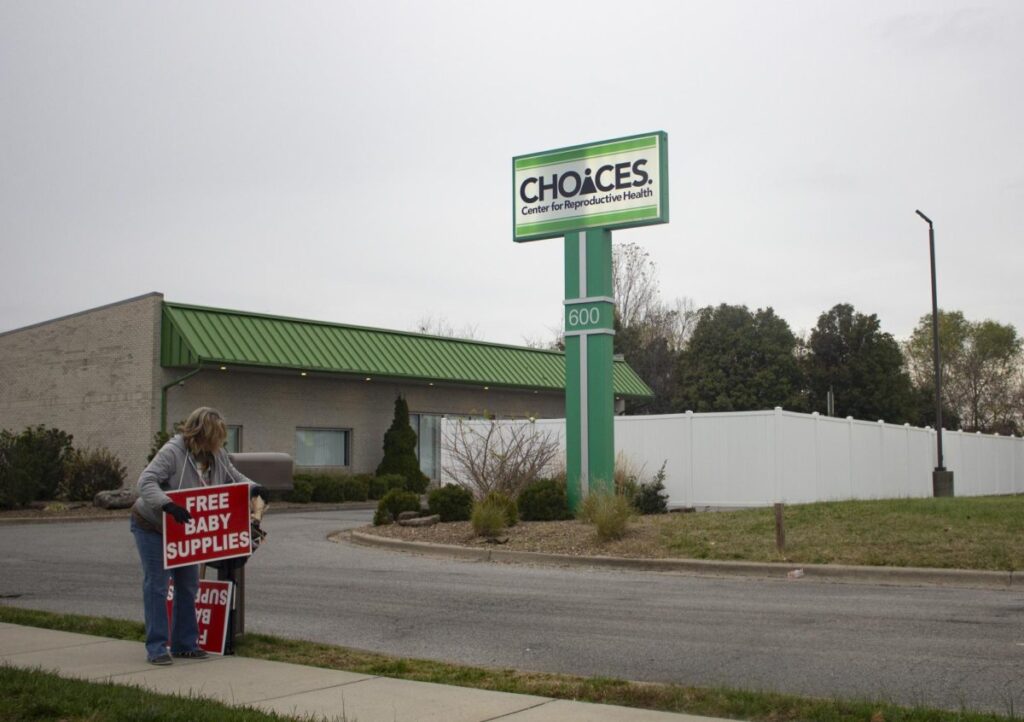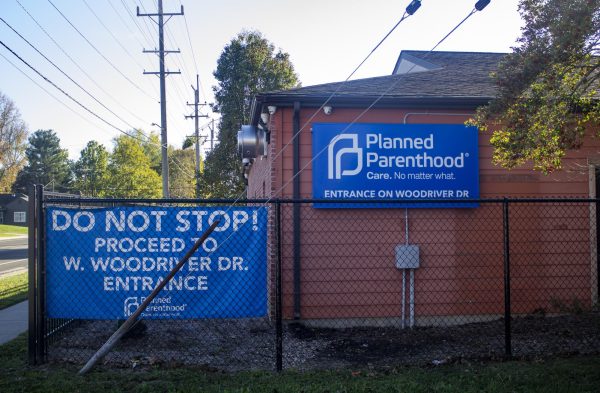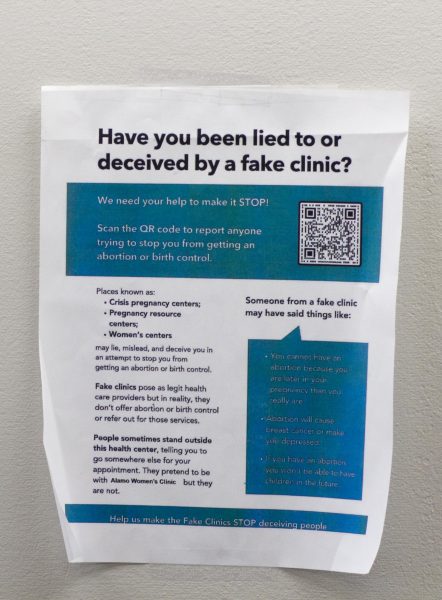
The U.S. Supreme Court’s decision to overturn Roe v. Wade placed Carbondale at the heart of the abortion access debate. As conservative states across the Midwest and South swiftly moved to ban abortion, Illinois emerged as a refuge for people seeking access to reproductive care.
Health care providers saw Carbondale, in particular, as an important access point due to its southern location and train access. Three abortion clinics had opened shortly after the 2022 Dobbs v. Jackson Women’s Health Organization decision, but not without controversy. As quickly as they opened, the clinics began to face anti-abortion advocates. In January 2023, Carbondale amended its disorderly conduct ordinance to implement “buffer zones” outside of medical facilities; the ordinance has since been repealed.
An anti-abortion organization is now challenging the measures Carbondale put into place to protect the clinics in a legal case that could have national implications. The Supreme Court is scheduled to discuss the case this Friday in its weekly conference and could decide decide then whether to hear full scale arguments. The case is Coalition Life v. City of Carbondale.
Hill v. Colorado paves the way
In 2000, the Supreme Court upheld a Colorado ordinance that created an 8-foot “bubble zone” around any person within a 100-feet radius of a healthcare facility, including abortion clinics. The zone prevented any person engaging in expressive activity, such as protests and leafleting, from approaching the target audience without their consent. In the years since the court’s decision, many cities around the country adopted similar laws, including Carbondale, Illinois.
“We’re constantly seeing some form of protest activity at our health centers across the state,” said Patience Roundtree, director of advocacy and organizing for Planned Parenthood of Illinois.
Planned Parenthood is the most recent reproductive care organization to open a location in Carbondale. Its doors opened in December 2023, over a year after CHOICES Center for Reproductive Health and Alamo Women’s Clinic moved to Carbondale in fall 2022.
The organization has seen “an uptick of anti-abortion extremists” since Roe was overturned, Roundtree said. Its health center in Peoria was firebombed in August 2023. Due to extensive damage, the facility had to shut down. It reopened in June 2024.
“Fortunately for us no patients, staff, supporters, were injured; that was done after hours,” Roundtree said. “But we’ve seen regular anti-abortion protesters, people who have been showing
up for years with maybe a church group in the neighborhood, be recruited by other groups. Those same people have become emboldened and increasingly hostile, and at times, have needed to be removed by the police.”
On Jan. 10, 2023, the Carbondale City Council adopted Ordinance No. 2023-03 to enforce regulations against disorderly conduct. In the ordinance, the council mentioned reports from staff members and patients of the clinics regarding “frequent acts of intimidation, threats, and interference from individuals protesting abortion access and services.” Like Colorado, the ordinance made it illegal to come within 8 feet of a person without their consent within a 100-foot radius of a medical facility. But it began to raise a debate.
One pro-life organization had made its way from St. Louis to Carbondale following Missouri’s statewide near-total ban on abortion: Coalition Life, a non-profit with a mission of “ending abortion peacefully and prayfully.”
“Our primary role is to be there for women who feel pressured, coerced or even forced into an abortion,” said Brian Westbrook, founder and executive director of Coalition Life. “We want to be there to offer them real, tangible resources so that they can ultimately choose life.”
Westbrook said being pushed back 8 feet would cause the organization to have to raise their voices at those seeking an abortion, which is not what they intend to do.
“That’s not how you help women,” Westbrook said. “That’s not how you have a genuine conversation with people, is yelling and screaming. Instead, we want to have an intimate conversation, even if it’s just for 30 seconds or a minute. We want to have that one-to-one conversation with individuals.”
According to its website, Coalition Life participates in what they call “professional sidewalk counseling” at five abortion clinics; the three in Carbondale, one in Flossmoor, Illinois and one in Kansas City, Kansas. Westbrook said the sidewalk counselors are made up of volunteers and staff members, who are paid to work sidewalk shifts.
“We don’t call it protesting because we aren’t there to protest,” Westbrook said. “We are there to offer real, tangible resources to women.”
Westbrook said the resources include free ultrasounds and pregnancy tests, STD testing and “options coaching,” which can be conducted at Women’s Care Connect, a pregnancy care center in St. Louis. He added that the organization also connects clients with external resources as needed, such as substance abuse recovery programs and financial assistance.
Thomas More Society, a conservative law firm based in Chicago, filed a lawsuit against the City of Carbondale on behalf of Coalition Life in May 2023 to challenge the constitutionality of the bubble zone ordinance.
“On the sidewalk, there is no political speech, there’s no violence, there’s no yelling. It’s very much a peaceful and prayerful discussion,” Westbrook said. “And I think that’s kind of our whole point with the bubble zone, is that the bubble zone would prevent us from having face-to-face conversations and soft conversations that aren’t threatening.”
After a lower court dismissed the case, it moved to a federal appeals court, which also dismissed it on March 8, 2024. The appeals court cited Hill v. Colorado, the Supreme Court’s decision to uphold Colorado’s bubble zone law, stating that it “remains binding.” Court records show that Coalition Life conceded in response to the ruling, as “it cannot prevail unless Hill is overruled.”
With help from the Thomas More Society, Coalition Life filed a petition for Writ of Certiorari, a formal request for the Supreme Court to review the case. It was filed on July 16, 2024, after the organization requested an extension on May 24, 2024.
Three days before the petition was filed, however, Carbondale City Council repealed its bubble ordinance. But Coalition Life is still putting up a fight, hopeful that the Supreme Court will consider the case.
So what does this mean going forward?

Review of First-Amendment rights
According to SCOTUSblog, the issue of the pending petition Coalition Life v. City of Carbondale, Illinois is whether the court should overrule Hill v. Colorado. On June 28, 2000, the Supreme Court ruled 6-3 that the right to free speech was not violated by Colorado’s buffer zone law.
Westbrook said he believes buffer zones negatively impact both parties.
“If you can’t approach them and have a conversation with them, it’s very difficult to provide resources and information to individuals,” he said. “And so it’s really a violation of both the sidewalk counselors’ free speech and also the free speech of the or access of information of those people who are driving into an abortion facility.”
But Andrea Gallegos, executive administrator of Alamo Women’s Clinic, said that she believes buffer zones are necessary to protect patient privacy and safety.
“Our protesters already are intimidating to patients,” she said in an interview on Thursday. “The tactics that they use are very misleading. They try to wave and smile and get patients to stop for them, and then a lot of patients tell us they think they’re affiliated with the clinic and they’re not. And then they start giving them misinformation, and the buffer zone keeps them within a
distance, you know, away from our front entrance. And so once they’re in the parking lot, patients feel safer.”
She said anti-abortion activists who come to the clinic often wear cameras and record the people they talk to.
“What they do about it with those videos, I don’t know, but the further away they can be kept from the entrance of the building, I think the better, and patients definitely feel safer,” she said.
Gallegos said that she finds the claim of an infringement on First Amendment rights “very hypocritical.”
“The very definition of what protesters stand for at an abortion clinic is an infringement on people’s privacy, on people’s right to access health care, right to make decisions for their own bodily autonomy…This is the only setting that you’ll ever — you don’t drive to a dental appointment and have to have protesters stop you out in the driveway. This only happens at abortion clinics, and they give false information,” she said.
Roundtree also offered a response to the claim.
“We respect free speech,” she said. “I believe in free speech. They can still exercise that right, but people shouldn’t be harassed or intimidated for trying to access health care. So we just want to ensure that our patients and our staff feel safe.”
William Freivogel, a Missouri lawyer and professor of journalism at Southern Illinois University noted that the First Amendment is “not absolute.” Freivogel covered the U.S. Supreme Court in Washington, D.C. from 1980 to 1992 and has written about abortion legislation for 40 years, he said.
“There are all sorts of restrictions on speech, and in the case of abortion protests, where you have protestors sometimes getting in the face of patients seeking legal medical treatment, that is a situation where a protest bubble has been found by the Supreme Court in the past, (in Hill v. Colorado) to be constitutional,” he said.

Repealed law raises questions
On July 13, 2024 – 18 months after the City of Carbondale adopted its bubble zone ordinance – the City Council voted 6-0 to repeal the ordinance in a meeting that lasted just four minutes. City Attorney Jamie Snyder told WPSD Local 6 that the ordinance was repealed because nobody violated it.
The Daily Egyptian reached out to the City Council for comment, but was told by Chief of Police and Interim City Manager Stan Reno that the city does not provide responses on pending legal matters.
Additionally, City of Carbondale’s brief in opposition to Coalition Life claims that the bubble zone ordinance was never enforced, nor does the city plan to enact it. The council noted that it had already concluded other city and state laws provide “sufficient protection from acts of disorderly conduct.”
Yet Westbrook said he believes that there is still “chilled speech.”
“It took them four minutes to repeal that, and assuming that we stopped fighting, it will take them four minutes to put the bubble zone back in,” he said.
Gallegos said pro-life activists will be at clinics with or without buffer zones. To ensure patients are still protected now that the law is repealed, both the Alamo Women’s Clinic and Planned Parenthood escort patients inside and are working to alert patients about what they might encounter prior to their visit.
Freivogel said that because Carbondale’s ordinance was repealed, he does not believe the Supreme Court will take the case.
“I think it has procedural problems because…the law was repealed and never enforced, and that the Supreme Court would want a cleaner case where it had actually been enforced and inhibited somebody from protesting,” he said.
However, he noted that a recent update from the court makes the status of the petition uncertain. SCOTUS has a decision to make
Coalition Life v. City of Carbondale, Illinois was distributed for a conference on Friday, Nov. 8. However, on Nov. 4, the conference was postponed. The Supreme Court is now scheduled to decide on Friday whether it will take up the case.
According to SCOTUSblog’s FAQ page, a rescheduled case means it has moved to a new conference without being considered by the justices at the first one. The webpage notes that it is nearly impossible to know the exact reason behind why a case has been rescheduled.
Freivogel offered several possibilities.
“When a case is carried over…from conference to conference, that often means that there is sentiment on the Court to take the case and schedule oral arguments, but I don’t know whether just rescheduling it means that as well or not,” he said. “It might mean that there’s a couple of justices or more on the court who are interested in the case.”
It could also have something to do with the transfer of power in the U.S., he said. Election Day took place on Nov. 5, so it was not yet determined which party would take hold of the Department of Justice. Additionally, neither of the candidates running for president was the incumbent.
“Oftentimes the Supreme Court will ask the Solicitor General before they decide whether to hear a case…to tell them what they think,” he said, referring to the lawyer that serves in the Department of Justice and speaks for the government in the Supreme Court. “And because as of Election Day, it’s going to be, once Trump is in office, it’s gonna be an entirely different Solicitor General with an entirely different view…I’m thinking, well, maybe the justices just decided, ‘Let’s wait and ask the Trump Justice Department what it thinks.’”
For the case to be argued by the Supreme Court, four justices must vote to take it. Several outcomes may occur
If the Supreme Court decides to take the case, a decision will either be made in favor of Coalition Life or the City of Carbondale.
“We are very, very hopeful that the Supreme Court will take up Coalition Life v. Carbondale and finally put Hill v. Colorado in the trash can where it belongs,” Westbrook said.
Roundtree chooses not to speculate on a decision, but noted Planned Parenthood’s top priority is “for everyone to have access to essential health care that they need, that they deserve.”
“We plan to do everything within our power to just ensure that our patients and our staff and our volunteer network are not only safe but taken care of,” she said.
Freivogel said Carbondale wouldn’t be the only place affected if the Supreme Court decides to take the case. For Tara Bell, an escort at Planned Parenthood who helps patients safely navigate protests in Carbondale, that’s a top concern.
“It would be even more unfortunate to see Carbondale lose something and then that precedence be taken and applied to other places as well, where even those cities lose even more rights,” she said.
Freivogel noted the majority of Supreme Court cases start at the local level, but the constitutional rulings apply nationwide.
“It wouldn’t just impact Carbondale,” he said. “If the Supreme Court takes this case and decides that Hill v. Colorado was incorrectly decided, it overturns that precedent, just like they decided in Dobbs (v. Jackson) that Roe v. Wade was incorrectly decided. Then that will have a national impact.”
In Dobbs v. Jackson, Mississippi State Health Officer Thomas Dobbs challenged local abortion clinic Jackson Women’s Health Organization.
“It was a local dispute that resulted in a ruling that had national application,” Freivogel said. “(In) Roe v. Wade, Jane Roe was a woman in Texas who was seeking an abortion. Wade was District Attorney of (Dallas) County. So all these things start as local legal disputes, but when the Supreme Court issues a constitutional interpretation, as they will be asked to do in this case by Coalition Life, then that has an application across the board.”
Bell said, “Even if we lose the bubble ordinance, we don’t want to lose more protections over squabbles with that particular organization regarding free speech.”
If the Supreme Court decides to take the case, the process would be lengthy. Freivogel said it would probably take a year for a ruling to be made.
“If they take it, then after a few months, they schedule an oral argument, which could either be at the end of this court term in their last arguments in late spring, or they would schedule it for the next court term that would begin the following October of 2025,” he said, adding that cases like these often have a large number of amicus curiae briefs written on each side, potentially 100.
Amicus curiae briefs are arguments written by parties that are not associated with the legal case but have been permitted to offer expertise or insight to the court. After the briefs are reviewed is when the oral argument would be held, Freivogel said.
“More months would pass, and probably in early 2026 there would be a decision,” he said.
Carly Gist is the news editor at the Daily Egyptian at Southern Illinois University at Carbondale. Gist can be reached by email at cgist@dailyegyptian.com or on Instagram @gistofthestory. Versions of this story ran in the Daily Egyptian and Capitol News Illinois.
- Erasing history: Federal judge likens Trump’s order to remove slavery exhibit near Liberty Bell to Orwell’s 1984
- ‘Sorry, AP Chem’: How student media at one Missouri high school covered a walkout to protest ICE
- News analysis: Missourians take leading roles in Trump’s ‘weaponization’ of the Justice Department and election denial
- Commentary: Stars and Stripes’ legacy of editorial independence shows value of a free press
- News analysis: Trump’s handling of Minnesota investigations defies time-tested procedures and looks like a ‘cover-up in plain sight’
